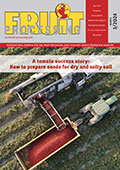Five things to know about fruit juice, from experts at the Fruit Juice Science Centre
A poll1 of more than 3000 adults, commissioned by the Fruit Juice Science Centre, has found that two thirds of Brits (65 %) and more than a third of French and German adults (34 %) drink 100 % fruit juice to support their immune function. The beverage was most frequently listed after fruit and vegetables amongst the top immunity-support foods.
However, there was less awareness about the nutrients provided in fruit juice, with just half of adults overall agreeing that a daily glass is rich in vitamins and minerals. Fewer than a fifth in France and Germany, and a third in the UK, knew that antioxidants – such as vitamin C – can be found in fruit juice. And most didn’t realise that fruit juice contains polyphenols – beneficial plant compounds also found in fruit, vegetables, and cocoa.
With internet searches on vitamin C soaring during the pandemic, nevertheless four in ten Brits and Germans, and more than half of French didn’t know that vitamin C is necessary for healthy immune function. This is despite six in 10 being more aware of immune health since the pandemic.
Commenting on the survey, Dr Carrie Ruxton from the Fruit Juice Science Centre said: “Awareness of how a glass of fruit juice supports normal immunity has improved but there are still some misconceptions. Considering that 100 % juice is simply squeezed fruit – and has practically identical sugars, vitamins, and positive bioactive compounds compared with whole fruit – there is still a lot of nonsense claimed about fruit juice.
“A key myth is that sugar is added to fruit juice, which it isn’t since that would be illegal in the EU and UK. Another is that the vitamin C in packaged fruit juice is destroyed – that’s also untrue. Neither is it correct to say that pure fruit juice contains preservatives and colours, although thankfully only one in 10 people in our Poll believed that.”
Five facts on fruit juice – from the Fruit Juice Science Centre
- Just one small glass of 100 % fruit juice provides more than 80 % of the vitamin C recommendation. Vitamin C is an antioxidant and essential for normal immunity;
- Orange juice is one of the richest sources of hesperidin, a polyphenol that has anti-inflammatory effects;
- Fruit juice is high in potassium, a mineral that helps to control blood pressure;
- It takes one or two oranges to make a 150 ml glass of fruit juice and all the sugars in fruit juice come from the fruits used to make them – none is added;
- Apple, orange, and grapefruit juices are all low GI (glycaemic index) meaning that they raise blood sugars more slowly compared with high GI foods, such as rice, bread, or sugar-sweetened drinks.
How about sugar
The Fruit Juice Science Centre poll found that eight in 10 adults believe that 100 % fruit is not high in sugar. Additionally, a quarter of Brits (24 %) and Germans (28 %), and more than a third of French (35 %), think that pure fruit juice is actually low in sugar. The reality is that a typical glass of orange juice contains the same level of natural sugars (around 13 g) as a couple of oranges.
Dr Ruxton says: “Fruit juice is enjoyed by millions of people every day and most seem to recognise that it has a positive role in the diet. Given that most of the sugar we eat comes from sugar-sweetened drinks, biscuits, cakes, confectionery and desserts – foods which are low in essential nutrients – it’s clear where we need to turn our attention to cut sugar intakes.”
1Independent poll of 1029 UK adults, 1021 French adults and 1012 German adults; data on file.
Barry Callebaut, one of the world’s leading manufacturers of high-quality chocolate and cocoa products, leverages its deep scientific knowledge of the cacaofruit and the fruit’s supportive health effect, by presenting the first nutraceutical fruit drink. The new cacaofruit elixir – made from 100 % pure cacaofruit – has a zesty fruity taste. By unlocking the power of science, the elixir is uniquely crafted to preserve the nutrients of the cacaofruit.
The cacaofruit naturally contains the required amount of flavanols to optimize the blood flow across the entire body. It is a good source of iron, magnesium and potassium. Besides the 100 % pure cacaofruit elixir, combinations with herbs and other fruits can be explored to enrich the range with beautiful taste combinations and additional nutrients. The nutraceutical fruit drink contributes to personal as well environmental health. Since it upcycles the whole cacaofruit, ‘Elix’ positively impacts nature and communities.
Gen X believe they need to nurture their nature
Covid accelerated consumers’ interest in the beauty of food and the beneficial health effects of eating and living well. Generation X –born between the mid-1960s and the early-1980s – believe they need to nurture their nature. To keep their body and mind strong, they look out for whole foods that are scientifically proven to actively support their health. They are well informed about which, and what amount, of macro- and micro nutrients to consume.
The cacaofruit elixir has been tested and validated through consumer research by independent global research agency MMR in the UK and the US. As part of these studies Elix’s consumer appeal and purchase intent have been tested, indicating a high interest in the new nutraceutical fruit drink category.
Promoting circulatory health
The health effects of cacaofruit flavanols have been studied by experts across the globe for decades and they have found sound scientific proof of their benefits on human health and wellness. Barry Callebaut’s deep scientific knowledge of the cacaofruit and the effect of the fruit’s flavanols on circulatory health are recognized by the European Food Safety Authority (EFSA), which resulted in the approval of the related health claim under the EU Nutrition and Health Claims regulation. Approval by the US Food and Drug Administration (FDA) is pending in spring 2022. Cacaofruit flavanols help maintain the elasticity of blood vessels which benefits the blood flow to, for example, organs such as the heart, muscles, brain, and skin.
The science of cacaofruit
Composed of almost 20,000 different types of molecules, the seed of the cacaofruit is one of the most complex food substances on earth. The R&D behind the cacaofruit elixir ‘Elix’ took Barry Callebaut more than 15 years. In addition, there is data available from more than 100 human clinical studies which provide sound scientific proof of the health effects of the cacaofruit flavanols.
Symrise AG reliably continued its profitable growth course in 2020 despite the challenging environment. The Group increased its sales by 3.3 % to € 3,520 million taking into account portfolio and currency translation effects. In organic terms, sales went up by 2.7 %. The Group thus significantly outperformed market growth, which is estimated at 1.0 % for 2020. At the same time, Symrise stayed behind its defined sales target, as the business development in the month of December was impacted by a criminal cyber-attack. Earnings before interest, taxes, depreciation and amortization (EBITDA) rose by 5.8 % to € 742 million in 2020. Profitability reached an outstanding level with an EBITDA margin of 21.1 % and was within the expected margin range. Against the backdrop of the good performance, the Executive Board and the Supervisory Board propose a dividend increase to € 0.97 for the fiscal year 2020 to the annual general meeting.
You can find the complete company report here.
Better Juice, Ltd., the first foodTech startup to develop innovative technology to reduce all types of sugars in orange juice, and Citrosuco S.A, Brazil, one of the largest orange juice producers worldwide, are teaming up! The new collaboration aims to set up a pilot plant to reduce sugars in orange juice. Citrosuco is providing some of the funding plus technical and operational expertise.
Fruit juices contain vitamins, minerals, and many other beneficial nutrients, but this natural drink comes with three types of sugars. Better Juice’s game-changing enzymatic technology naturally transforms all types of fruit sugars into prebiotic and other non-digestible fibers and sugars.
“Our device use non-GMO microorganisms to convert the sugars, and provides orange juice manufactures a ready opportunity to meet the trends and claims for reduced sugars, all while keeping the juicy flavor of the beverage,” says Eran Blachinsky, PhD, Founder and CEO of Better Juice. “The global orange juices market is valued at dozens of billion US$ with outstanding potential to create better-for-you orange juice beverages.”
“We have been seeking an orange juice sugar reduction technology for some time,” says Alex Marie Schuermans, Product Development and Applications General Manager of Citrosuco. “Better Juice’s solution holds a lot of promise and we are confident that by combining their technology with our know-how, we can accelerate production of the first sugar-reduced orange juice.”
“This collaboration with Citrosuco is a vote of confidence in Better Juice’s leading technology and its capabilities for reducing sugar in orange juice,” notes Blachinsky. “We’re excited to work with this strategic partner and help create juices with low sugar — the latest frontier in sugar reduction.”
“Our proprietary technology can be tuned to reduce between 30 % to 80 % of all the sugars in orange juice,” explains Blachinsky. “Making it easy conform to the minimum 25% reduction required by the FDA, as well as the 30 % reduction required by the EFSA for allowable claims of ‘reduced sugar’ in food and beverage products.”
The startup won the “Most Innovative Technology” award at the 2018 Startup Innovation Challenge at Health ingredients Europe in Frankfurt for its sugar reduction technology, which it developed in conjunction with The Hebrew University in Rehovot, Israel, and The Kitchen Hub incubator, Ashdod, Israel.









